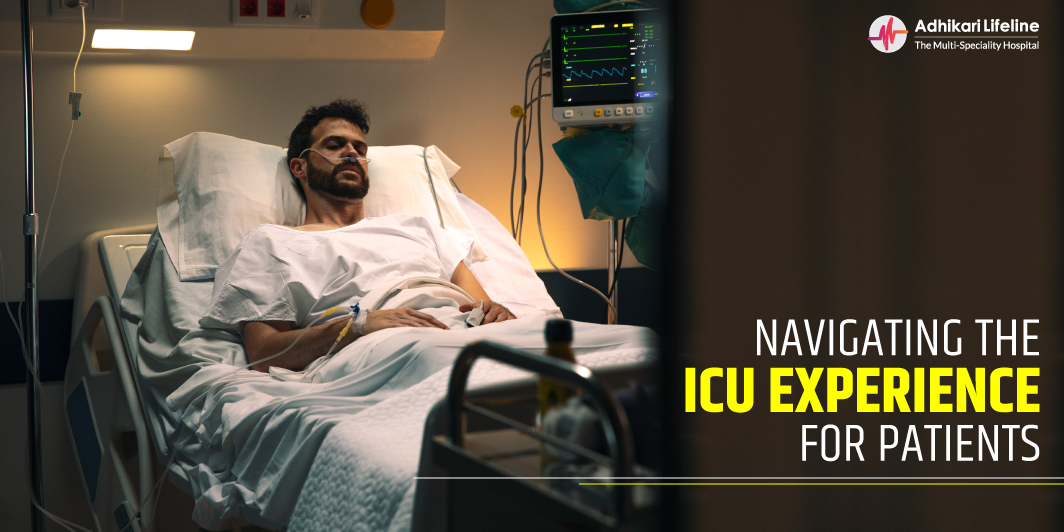Being admitted to the Intensive Care Unit (ICU) can be a scary experience for patients and their loved ones. The ICU environment is highly medicalized with various machines, monitors, tubes and IV lines which can feel very overwhelming. At Adhikari Lifeline Hospital, the best ICU Hospital in Boisar, Palghar, our goal is to make the ICU experience as comfortable as possible for patients and their families. In this blog, we will discuss what to expect in the ICU and how to navigate the ICU experience for patients with tips from our experienced doctors and staff. Let’s begin!
Introduction to the ICU
The ICU, also known as the Intensive Care Unit, is a special department of a hospital that provides intensive care medicine and monitoring for critically ill patients. The ICU at Adhikari Lifeline Hospital in Boisar, Palghar is a specialised unit equipped with ventilators, multi-parameter monitors and other advanced life-support equipment. Patients admitted to the ICU require close medical supervision and monitoring around the clock due to critical illnesses like multiple organ failure, sepsis, major accidents or post surgical complications that require advanced support.
In the ICU, specially trained doctors, nurses and technicians known as intensivists closely watch over patients and their vital signs. Various tubes, cords and IV lines will be attached to deliver medications, perform procedures, monitor conditions and provide respiratory and circulatory support if needed. Seeing all the equipment can feel scary, but know that it is there to help stabilize and treat the patient’s condition in a critical time of need.
What to Expect in the ICU
Once admitted to the ICU, patients and families should expect the following:
Round-the-clock monitoring: Patients will have cardiac monitors attached to continually track heart rate, rhythm and blood pressure. Oxygen levels will be monitored through a pulse oximeter. Other parameters like temperature and respiratory rate may also be tracked.
Intubated patients on ventilators: For patients with respiratory failure or those undergoing general anaesthesia, a breathing tube will be inserted through the mouth and attached to a ventilator to help with breathing. Patients may be sedated while on ventilator support.
IV lines and pumps: Multiple IV access points will deliver fluids and potent medications precisely through pumps directly into the bloodstream. IV antibiotics, vasopressors and other intravenous drugs are commonly used. At our ICU Hospital in Boisar, our team of doctors and intensivists is well-equipped and trained to handle critical patients.
Drains and catheters: Chest tubes, Foley catheters, and central lines may be inserted based on the underlying condition to drain fluid collections or monitor key pressures.
Frequent monitoring by doctors and nurses: Patients will be frequently examined, have vital signs checked and undergo procedures several times a shift by the ICU team aiming for around-the-clock coverage and rapid intervention if needed.
Communicating with Doctors and Nurses in the ICU
With the high-intensity and monitored environment of the ICU, families need to communicate effectively with the care teams. Our doctors and nurses at ICU Hospital in Boisar, Palghar recommend the following tips:
Clarify visiting hours: ICUs usually have restricted visiting hours to avoid overcrowding. Know the schedule and plan accordingly.
Ask questions: Feel free to ask doctors and nurses about the condition, treatment plan and prognosis. But be prepared for honest answers as outcomes may be uncertain.
Attend daily rounds: Ideally, one family member should attend rounds where the whole care team meets to discuss each patient.
Take notes: Important details, numbers or instructions from doctors are easily forgotten. Take notes you can refer back to.
Be patient with limitations: Understand communication may be difficult around intubated patients or during procedures and emergencies.
Provide medical history: Help teams by providing any pertinent history, medications, allergies or family health issues.
Coping with the Emotional Aspects in the ICU
Seeing a loved one critically ill and surrounded by medical equipment can take an emotional toll. Our ICU staff at Adhikari Lifeline Hospital in Boisar understand this and recommend the following:
Take breaks when needed: Spend some time away from the ICU to decompress when it all feels overwhelming.
Support from others: Having other family/friends for support can help share the emotional load during this difficult time.
Speak to a counsellor: Free counselling services are available if needed to cope better with the uncertainty and anxiety of critical illness.
Life after Leaving the ICU
Once patients are stable enough to transition out of the ICU, ongoing recovery will still be needed. Our doctors recommend the following:
Continue following the doctor’s instructions: Completing the prescribed recovery treatment plan is important for full recovery.
Anticipate weakness: Strength and stamina return slowly after critical illness. Graduated activity and rest are key.
Monitor for complications: Continued checkups are needed to watch for issues like infections as immunity may still be low.
Counselling; if needed: Emotional/psychological support is sometimes required to process the ICU experience.
Appreciate each milestone: Celebrate small accomplishments, as recovery requires patience and perseverance.
Conclusion
Navigating an ICU experience can be difficult both physically and emotionally. The care teams at Adhikari Lifeline Hospital’s ICU in Boisar, Palghar aim to provide not just life-saving treatment, but also compassionate support through this journey. As the best ICU hospital in Boisar, Palghar, patients can rest assured of receiving the highest levels of medical care, amenities and family support during their critical care needs. If you or a loved one requires ICU treatment, trust the experienced specialists at Adhikari Lifeline Hospital. We are here to provide gentle care and help patients lead healthier lives once again.

Leave A Comment